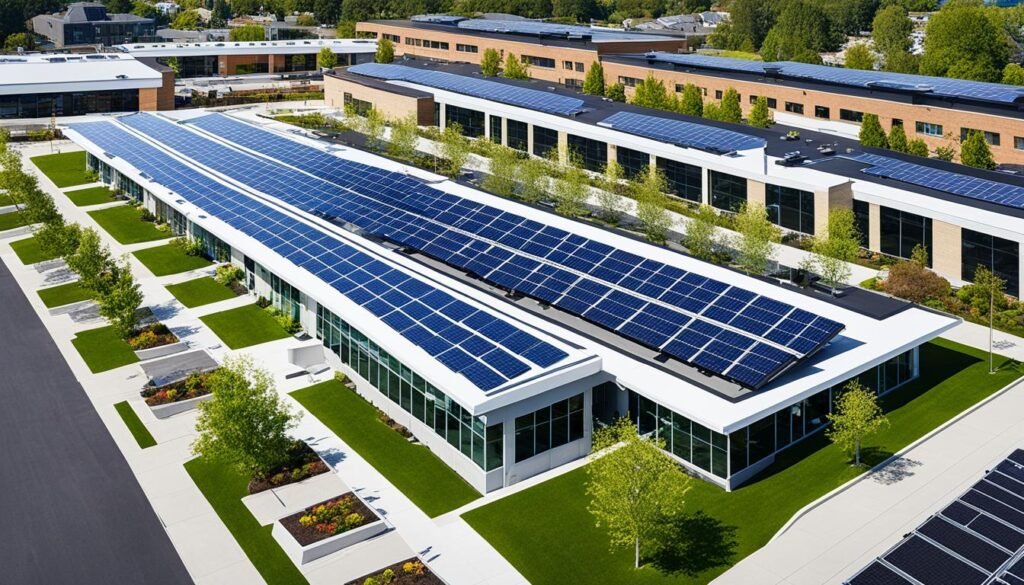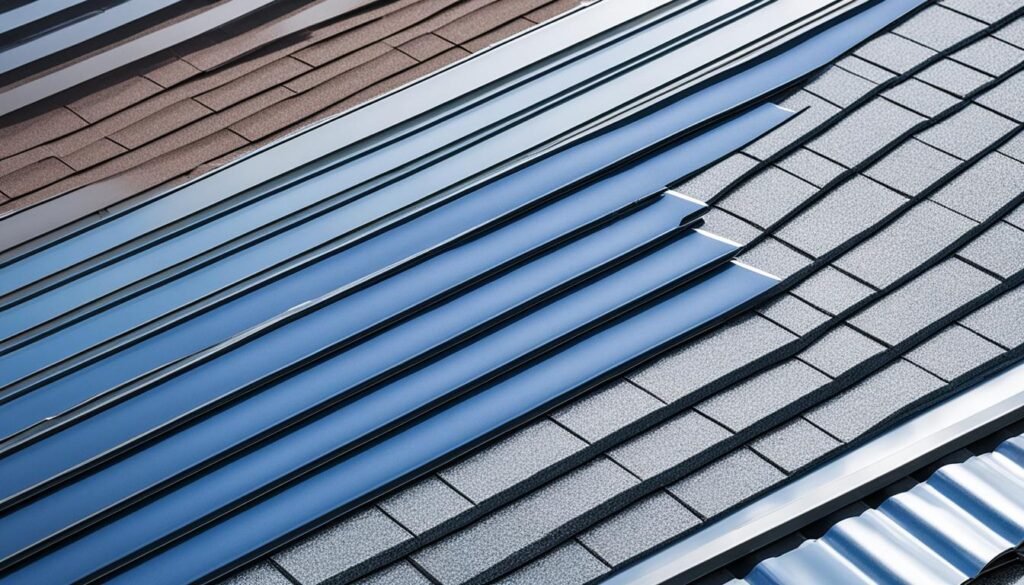Did you know that the world’s largest commercial roof spans over 50 acres? That’s equivalent to approximately 38 football fields! When it comes to commercial roofing, understanding the terminology is crucial for effective communication and decision-making.
From adhesion to TPO, there are numerous terms associated with commercial roofs and their materials. Each term represents a key aspect of the roofing industry, influencing the durability, performance, and overall quality of commercial roof systems.
Key Takeaways:
- Commercial roofing terminology plays a vital role in effective communication.
- Familiarizing yourself with terms like adhesion, TPO, and cover board empowers you to make informed decisions.
- Understanding commercial roof terminology helps you communicate effectively with roofing professionals.
- Knowing these terms helps you navigate through the various types of commercial roofs and their materials.
- Stay informed to ensure the longevity and functionality of your commercial roof.
Why Are Commercial Roofs Flat?
The primary reason why commercial roofs are often flat is because they offer several advantages for businesses. Let’s explore the benefits of flat commercial roofs:
- Cost-Effective: Flat roofs are more cost-effective to install and maintain compared to sloped roofs. The construction materials and installation processes for flat roofs are typically less expensive, making them an economical choice for commercial buildings.
- Utilization of Space: Flat roofs provide more usable space on the roof. This additional space can be utilized for various purposes, such as creating rooftop gardens, installing solar panels, or housing HVAC equipment. These additions not only enhance the aesthetic appeal of the building but also offer additional functionality.
- Wind Resistance: Flat roofs are less susceptible to wind damage compared to sloped roofs. The low profile of flat roofs minimizes the surface area that can catch the wind, reducing the risk of structural damage during severe weather conditions.
- Maintenance and Repairs: Flat roofs provide easier access for maintenance and repairs. Professionals can efficiently inspect, clean, and repair flat roofs compared to sloped roofs, which may require additional safety precautions and equipment.
Overall, the advantages of flat commercial roofs make them a practical choice for many businesses. The cost-effectiveness, additional usable space, wind resistance, and ease of maintenance and repairs all contribute to their popularity in the commercial roofing industry.
Comparison of Flat Roofs vs. Sloped Roofs
| Advantages | Flat Roofs | Sloped Roofs |
|---|---|---|
| Cost | Often more cost-effective | Higher installation and maintenance costs |
| Usable Space | More space for gardens, solar panels, etc. | Limited usable space |
| Wind Resistance | Less susceptible to wind damage | Increased risk of wind damage |
| Maintenance and Repairs | Easier access and maintenance | More complex maintenance and repairs |

“Flat roofs provide businesses with cost-effective solutions, additional usable space, wind resistance, and easy maintenance and repairs.”
Types of Commercial Roofing Materials
When it comes to commercial roofing, there are various materials available to suit different needs and preferences. Understanding the options can help you make an informed decision while choosing the best roofing solution for your commercial building.
BUR (Built-Up Roofing)
BUR, also known as built-up roofing, is a popular choice for commercial buildings. It consists of multiple layers of bitumen and alternating layers of reinforcing fabric, providing excellent durability and protection against the elements. BUR is known for its resistance to UV rays, fire, and water, making it a reliable option for commercial roofs.
Single-Ply Membranes
Single-ply membranes are another widely used commercial roofing option. Two common types are EPDM (Ethylene Propylene Diene Monomer) and TPO (Thermoplastic Olefin). EPDM is a synthetic rubber membrane known for its flexibility, durability, and resistance to weathering. TPO, on the other hand, is a thermoplastic membrane that offers excellent energy efficiency and resistance to UV rays and chemicals.
Modified Bitumen
Modified bitumen roofing is a hybrid system that combines the durability of built-up roofing with the ease of installation of a single-ply membrane. It is created by adding modifiers, such as APP (Atactic Polypropylene) or SBS (Styrene-Butadiene-Styrene), to bitumen to enhance its performance. Modified bitumen roofs provide excellent flexibility, long-term durability, and resistance to extreme temperatures.
Metal Roofing
Metal roofing is a versatile and durable option for commercial buildings. It is available in various materials, including steel, aluminum, and copper, each offering its unique benefits. Metal roofs are known for their exceptional longevity, low maintenance requirements, and resistance to fire, wind, and impact. They also provide excellent energy efficiency and can be customized to suit different architectural styles.
Consulting with a professional commercial roofing service, such as Expert Roofing Solutions, can help you assess your building’s requirements and find the ideal roofing material. Consider factors like the climate, budget, energy efficiency, and specific needs of your commercial building to make the right choice for long-lasting protection.
| Roofing Material | Advantages | Disadvantages |
|---|---|---|
| BUR (Built-Up Roofing) | – Excellent durability – Provides UV, fire, and water resistance – Can be installed over existing roofs | – Higher installation complexity and cost – Requires regular maintenance |
| Single-Ply Membranes (EPDM and TPO) | – Flexible and durable – Resistant to weathering, UV rays, and chemicals – Energy-efficient | – Limited color options – Susceptible to punctures |
| Modified Bitumen | – Provides flexibility and high durability – Resistant to extreme temperatures – Easy and quick installation | – Requires regular maintenance – Not as resistant to UV rays as other materials |
| Metal Roofing | – Longevity and low maintenance – Excellent resistance to fire, wind, and impact – Energy-efficient and customizable | – Higher upfront cost – Can be noisy during heavy rain or hail |
By assessing the advantages and disadvantages of each commercial roofing material, you can make an informed decision that aligns with your building’s needs and budget. Trust the expertise of professional flat roof services, like Expert Roofing Solutions, for quality installation, maintenance, and repairs to ensure the longevity and functionality of your commercial roof.

Conclusion
Understanding the terminology and benefits of commercial flat roofs, as well as the different types of commercial roofing materials, is crucial when it comes to making informed decisions about your commercial building’s roof. By working with a reputable and experienced roofing company like Local Roofer Pros, you can ensure that your commercial roof is in capable hands.
With Local Roofer Pros, you gain access to expert flat roof services that can meet all your commercial roofing needs. Whether it’s installation, maintenance, or repairs, their team of skilled professionals is equipped to handle it all. By entrusting your commercial roof to Local Roofer Pros, you can feel confident in the longevity and functionality of your roof.
Contact Local Roofer Pros today at 951-666-5881 and benefit from their knowledge and expertise. Don’t settle for subpar workmanship when it comes to your commercial roofâchoose the professionals who prioritize quality and customer satisfaction. Let Local Roofer Pros take care of your commercial flat roof needs, so you can focus on what matters most: running a successful business.
FAQ
What are some commonly used terms in commercial roofing?
Some commonly used terms in commercial roofing include adhesion, aggregate, ballasted roofs, BUR (built-up roofing), cover board, elastomer, EPDM, flashing, galvanized steel, HVAC, membrane, single-ply membrane, substrate, TPO, and underlayment, among others.
Why are commercial roofs often flat?
Commercial roofs are often flat because they offer advantages such as cost-effectiveness, additional usable space, greater wind resistance, and easier access for maintenance and repairs.
What are the different types of commercial roofing materials?
Some common types of commercial roofing materials include BUR (built-up roofing), single-ply membranes (such as EPDM and TPO), modified bitumen, and metal roofing.
How can Local Roofer Pros help with my commercial roofing needs?
Local Roofer Pros provides expert flat roof services and can assist you in determining the best roofing solution for your commercial building based on factors such as climate, budget, and building requirements. Contact Local Roofer Pros at 951-666-5881 for professional assistance.
